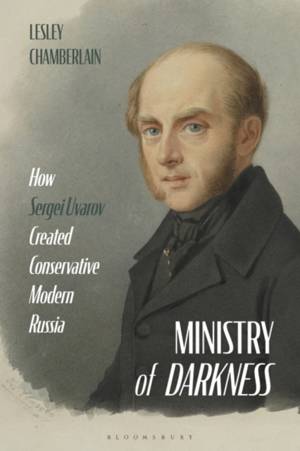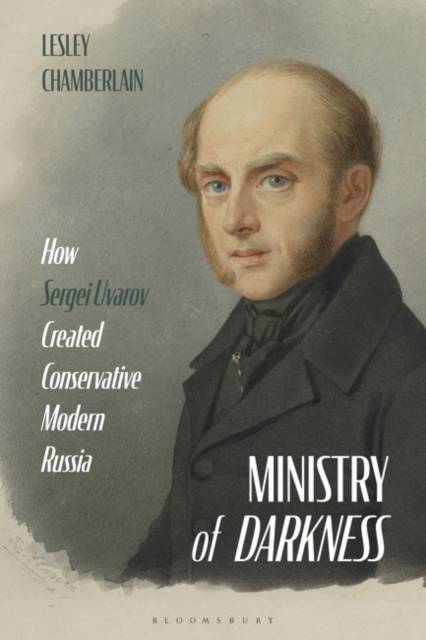
- Afhalen na 1 uur in een winkel met voorraad
- Gratis thuislevering in België vanaf € 30
- Ruim aanbod met 7 miljoen producten
- Afhalen na 1 uur in een winkel met voorraad
- Gratis thuislevering in België vanaf € 30
- Ruim aanbod met 7 miljoen producten
Zoeken
Ministry of Darkness
How Sergei Uvarov Created Conservative Modern Russia
Lesley Chamberlain
Hardcover | Engels
€ 186,95
+ 373 punten
Uitvoering
Omschrijving
There is nothing new about the Russian conservatism Putin stands for, acclaimed writer Lesley Chamberlain argues. Rather, as Ministry of Darkness reveals, the roots of Russian conservatism can be traced back to the 19th century when Count Uvarov's notorious cry of 'Orthodoxy, Autocracy, Nationality!' rang through the streets of Russia.
Sergei Uvarov was no straightforward conservative; indeed, this man was at once both the pioneering educational reformer who founded the Arzamas Writers' Club to which Pushkin belonged, and the Minister who tyrannised and censored Russia's literary scene. How, then, do we reconcile such extreme contradictions in one person? Through Chamberlain's intimate examination of Uvarov's life and skilled analysis of Russian conservatism, readers learn how the many paradoxes that dominated Uvarov's personal and political life are those which, writ large, have forged the identity of conservative modern Russia and its relationship with the West.
This fascinating book sheds new light on an often overlooked historical actor and offers a timely assessment of the 19th-century 'Russian predicament'. In doing so, Chamberlain teases out the reasons why the country continues to baffle Western observers and policymakers, making this essential reading both students of Russian history and those who want to further understand Russia as it is today.
Sergei Uvarov was no straightforward conservative; indeed, this man was at once both the pioneering educational reformer who founded the Arzamas Writers' Club to which Pushkin belonged, and the Minister who tyrannised and censored Russia's literary scene. How, then, do we reconcile such extreme contradictions in one person? Through Chamberlain's intimate examination of Uvarov's life and skilled analysis of Russian conservatism, readers learn how the many paradoxes that dominated Uvarov's personal and political life are those which, writ large, have forged the identity of conservative modern Russia and its relationship with the West.
This fascinating book sheds new light on an often overlooked historical actor and offers a timely assessment of the 19th-century 'Russian predicament'. In doing so, Chamberlain teases out the reasons why the country continues to baffle Western observers and policymakers, making this essential reading both students of Russian history and those who want to further understand Russia as it is today.
Specificaties
Betrokkenen
- Auteur(s):
- Uitgeverij:
Inhoud
- Aantal bladzijden:
- 328
- Taal:
- Engels
Eigenschappen
- Productcode (EAN):
- 9781350116696
- Verschijningsdatum:
- 31/10/2019
- Uitvoering:
- Hardcover
- Formaat:
- Genaaid
- Afmetingen:
- 156 mm x 234 mm
- Gewicht:
- 635 g

Alleen bij Standaard Boekhandel
+ 373 punten op je klantenkaart van Standaard Boekhandel
Beoordelingen
We publiceren alleen reviews die voldoen aan de voorwaarden voor reviews. Bekijk onze voorwaarden voor reviews.








